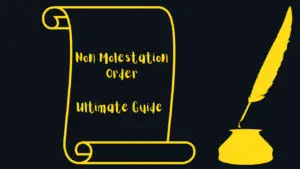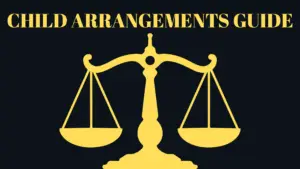Last Updated: Saturday, 6 September 2025
You know the CAFCASS safeguarding call is coming. You also know that your ex-partner has made serious, untrue allegations against you. The thought of having to listen to and respond to these lies over the phone with a social worker can be infuriating and terrifying. I have been subjected to significant emotional discomfort when preparing fathers for this exact moment. Your instinct is to fight, to shout, to defend your character with passion.
That instinct is a trap. The safeguarding call is not a debate you can win with emotion; it is a risk assessment you can only navigate with calm, strategic composure. As a consultant who has made these calls and seen fathers make critical mistakes, I can tell you that how you respond to false allegations is more important than almost anything else. This guide will provide you with a clear, step-by-step strategy for responding to lies in a way that builds your credibility, not destroys it.
Key Takeaways:
- Deny Calmly and Clearly. Your first response to a false allegation should be a simple, calm denial. Do not get angry or defensive, as this can make you appear like the person your ex has described.
- Do Not Get Dragged into a “He Said, She Said” Argument. The call is not the venue for a detailed rebuttal of every single lie. Your role is to deny the allegation and state that you will provide a full, evidence-based response in your formal court statement.
- Pivot to Child-Focused Concerns. After denying an allegation, immediately pivot the conversation back to your child’s welfare. This demonstrates to the officer that you are the child-focused parent, not someone obsessed with the adult conflict.
- Acknowledge Context Where Appropriate. If there is a grain of truth that has been twisted (e.g., you admit to shouting during arguments), it is better to be honest and provide that context than to issue a blanket denial that can be disproven later.
Facing false allegations and worried about your CAFCASS call? WhatsApp us today for expert preparation.
Quick Navigation:
The Three-Step Method for Responding to Allegations
When the CAFCASS officer outlines an allegation your ex has made, your response should be a methodical, three-step process. This allows you to address the lie, demonstrate your positive character, and take control of the conversation. As a former CAFCASS officer, I can assure you that an officer is far more impressed by a father who can remain calm and child-focused under pressure than one who gets angry and defensive. This method is your best tool for achieving that.
A Script for Responding to a False Allegation
CAFCASS: “The mother has alleged that you have been financially controlling during the relationship.”
Your Response:
- ✅ (Step 1: Calmly Deny) “Thank you for letting me know. I deny that allegation. That is untrue.”
- ✅ (Step 2: Briefly Reframe/Correct – Optional) “My experience was that we managed our finances together as a team. I work in finance and I encouraged us to create a shared budget to manage our expenses after our daughter was born. I will provide evidence of this in my statement.”
- ✅ (Step 3: Pivot to Child Welfare) “My primary concern at the moment, however, is that I haven’t been able to see my daughter for three weeks. It’s a huge disruption to her routine, and I am worried about the emotional impact this separation is having on her. I am hoping CAFCASS can recommend that our contact restarts as soon as possible.”
Need help practising these responses? Message us on WhatsApp — we’ll role-play the call with you.
A Deep Dive: The Difference Between “Denying” and “Explaining”
This is a subtle but crucial distinction that fathers often get wrong in the heat of the moment. Knowing when to simply deny an allegation versus when to provide context is a key strategic skill.
Official Definition: In the context of a CAFCASS call, a denial is a clear and simple rebuttal of an allegation (“That did not happen”). An explanation provides context, background, or your version of events for an incident that did happen but which you believe has been misrepresented.
Breakdown of Components:
Think of this section as the nuts and bolts. Here’s how the key concepts actually play out in practice – and what they mean for you as a father facing CAFCASS.
When to Simply Deny
What This Means For You: If an allegation is a complete fabrication with no basis in reality (e.g., “he threatened to burn the house down”), your response should be a firm and simple denial. As the advice goes, “if it never happened, there’s nothing to explain”. Trying to invent an explanation for something that never occurred will make you sound confusing and untrustworthy.
When to Explain Context
What This Means For You: This applies when your ex has taken a real event and twisted it. For example, she might allege you were “verbally abusive.” A simple denial is weak if you know you have shouted in arguments. A strategic response provides context: “I deny being abusive. However, when our relationship was breaking down, we did have arguments where we both raised our voices, which I regret. This was never in front of our child.”
Owning Your Mistakes
What This Means For You: This is the most powerful form of explanation and demonstrates insight, which CAFCASS values highly. If you have made a mistake, own it and explain what you have learned. For example: “I deeply regret sending that angry text message. It was a mistake, born out of frustration at contact being cancelled again. It is not how I want to communicate, and I am committed to a more respectful approach going forward.” This shows maturity and self-awareness.
A Real Life Scenario: An ex-partner alleges that the father tried to “abduct the child from nursery.” A reactive father might shout, “That’s a lie!” and become angry. A strategic father would use the “explain context” method: “I deny that I tried to abduct my child. That is a serious and untrue allegation. What happened was that I attended the nursery, as is my right as a parent with Parental Responsibility, to inform them of our separation and provide my new contact details. I was transparent with the staff at all times.”
Common Pitfalls:
Even when dads understand the basics, there are subtle traps that can trip you up. These are the errors that quietly undermine your credibility without you even realising.
- Denying something that is provably true.
- Over-explaining a simple denial.
- Blaming her for your own mistakes.
At a Glance: A Strategic Response vs. A Reactive Response
This quick comparison shows the difference between the type of response that strengthens your credibility, and the type that can sink your case.
| Feature | A Strategic Response ✅ | A Reactive Response ❌ |
|---|---|---|
| Tone | Calm, measured, and factual. | ❌ Angry, defensive, and emotional. |
| Focus | On the child’s welfare and the future. | ❌ On the adult dispute and the past. |
| Language | “I deny that allegation. My concern is for our child…” | ❌ “That’s a complete lie! She’s always been like this…” |
| Goal | To demonstrate you are a reasonable, credible, and child-focused parent. | ❌ To “win” the argument and prove your ex is a liar. |
| Outcome | The officer notes your calm denial and your child-focused concerns. | ❌ The officer notes your angry and defensive demeanour, which may seem to confirm the ex-partner’s allegations. |
Worried about sounding reactive instead of strategic? WhatsApp us for calm, proven scripts that work.
Common Mistakes That Weaken Your Position
It’s not just what you say – it’s how you handle yourself under pressure. These common missteps can turn a strong case into a shaky one if you’re not careful.
- Interrupting the officer. Let them finish outlining the allegation or asking their question before you answer. Interrupting makes you seem aggressive and impatient.
- Making unfocused counter-allegations. Responding to her allegation of financial abuse with “well, she’s a bad mother” is not a direct response and sounds vindictive. Any concerns you raise must be specific and child-focused.
- Trying to rebut every single point. The call is not a fact-finding hearing. Your goal is to give a top-line response and set the tone, not to engage in a detailed legal argument. Save that for your Position Statement.
- Sounding scripted. While you must prepare, your answers should sound natural. It’s better to use bullet points to remind you of key themes rather than reading from a pre-written paragraph.
FAQs: Handling False Allegations on the Call
Fathers facing this call often have these urgent questions.
Will the CAFCASS officer believe her allegations automatically?
No. The officer’s job is not to believe anyone at this stage. Their role is simply to record both parents’ positions and report them to the court. They are trained to be neutral information-gatherers and understand that allegations are common in high-conflict separations.
What if I get emotional and angry on the call?
This is a major risk. An angry or emotional response can be interpreted by the officer as evidence that confirms your ex-partner’s allegations of you being aggressive or unstable. If you feel yourself getting angry, take a breath and say, “I’m sorry, I find these allegations very upsetting. Let me take a moment to answer calmly.”
How do I prove the allegations are lies during a phone call?
You don’t. The phone call is not the place to present your evidence. You simply state your denial and inform the officer that you will provide your evidence (e.g., text messages, emails, witness details) to the court in your formal written statement.
Should I make my own allegations against her during the call?
You should only raise your own concerns if they are genuine, child-focused safeguarding issues. Do not invent counter-allegations just to “level the score.” You must be able to explain how her behaviour negatively impacts the child’s welfare.
The allegations are true, but she’s twisting them. What do I do?
Be honest and provide context. For example: “Yes, I did send her that angry text message, which I regret. It was in the heat of the moment after she had cancelled contact with our son for the third time in a row. It was a product of the conflict at the time, and I am committed to communicating better now.”
What if the officer seems biased against me?
Stay calm and polite. The officer is a professional doing their job. Even if you feel they are being unfair, being hostile towards them will only be noted in their report and will damage your case. Continue to answer questions calmly and factually.
Do I have to answer every question?
Yes, you must engage with the process. Refusing to answer questions will be seen as obstructive and uncooperative. If you don’t know the answer to something, it is better to say “I’m not sure, I would have to check” than to guess or refuse to answer.
My ex has a history of making false claims. Should I mention this?
Yes, calmly and factually. You can say: “These allegations are untrue, and they fit a pattern of false claims that have been previously investigated by the police, who took no further action. I will provide details in my statement.”
What if she has made up dozens of small allegations?
You do not need to respond to every single one in detail. You can group them together: “I have heard the allegations. I deny them. They are a misleading representation of our relationship breakdown, and I will be responding in full in my formal statement to the court.”
Can a McKenzie Friend help me on the call?
Yes. An experienced McKenzie Friend can be with you during the call to help you prepare, keep you calm, take notes, and advise you in real-time on how to answer difficult questions.
Insider Insight from Lach
CAFCASS officers deal with allegations every single day. We are trained to listen beyond the noise. An angry, defensive outburst sounds exactly like every other angry, defensive outburst we have ever heard. What cuts through is the rare sound of a father who, despite being under immense pressure and facing upsetting accusations, can remain calm, deny what is untrue with quiet confidence, and consistently bring the focus back to the well-being of his child. That is the father who sounds credible. That is the father who sounds safe.
Meet Lach, Your Guide at Dads Consultancy
Being falsely accused is an attack on your character. Getting expert support to prepare for this call is one of the most important investments you can make in your case.
Your safeguarding call could shape your whole case — WhatsApp us now to prepare properly.
Next Steps
At Dads Consultancy, we provide the specialised, expert support to help you navigate the intimidating process of a CAFCASS safeguarding call. Our founder is a former CAFCASS officer who understands exactly how to respond to false allegations in a way that builds your case rather than harms it. We can help you with:
- Handling the CAFCASS Call: We provide intensive, one-to-one preparation, role-playing the call and helping you structure your answers to be calm, child-focused, and strategic.
- Responding to Allegations: We help you formulate a clear and consistent response to any allegations of harm for all stages of your case.
- Drafting Powerful Position Statements: We guide you in writing the formal court statement where you can present your full, evidence-based defence.
- Making Your Application for Contact: We help you keep the focus on your children by making a robust application for a Child Arrangements Order.
Your ex-partner has created a narrative with her allegations. The safeguarding call is your first and best opportunity to present a different one: that of a calm, reasonable, and loving father. WhatsApp us today for a strategic consultation, and let’s ensure you are fully prepared.
🧠 Insider Insight: Lach, our founder, is a qualified social worker who used to write Section 7 reports for CAFCASS – the very reports that influence court outcomes. Now he helps dads respond to them. Learn more about Lach’s background.




